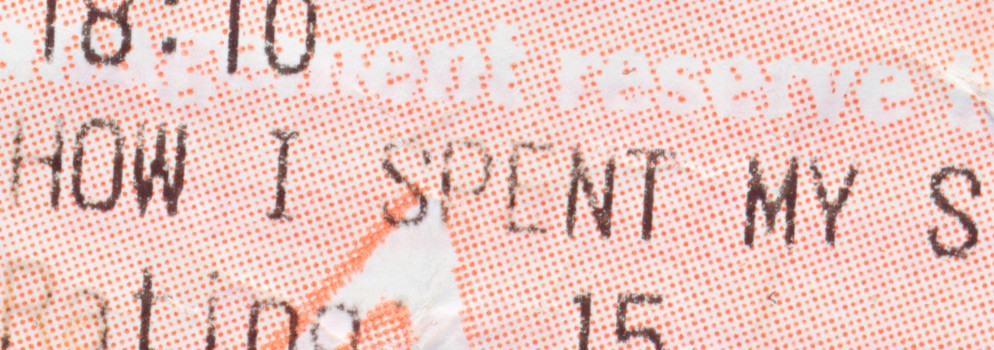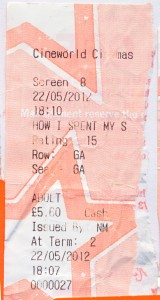How I Spent My Summer Vacation

The Compleat Angle
There’s an element that of ‘I got to see it in the theater and you didn’t’, and I would like to see it again, but I’m pretty sure How I Spent My Summer Vacation was the best genre film of 2012, and with some stiff competition.

 Leonard Award Winner
Leonard Award Winnerfor Best Genre film:
How I Spent My Summer Vacation.
How do I know? Because my notes are almost non-existent. Besides the fact that I didn’t know what I was doing, uh, sixteen months ago, yikes, there is always a strong element of not-writing when I’m having a good time, for fear of missing something onscreen.
As such, and until I see it again, I will bring up two things of note: the first, everybody is corrupt. Mr. Gibson steals from the mob and crosses the border into Mexico (this is at the beginning, it’s okay to reveal this. It’s also okay if it was the ending, in fact since you’re never going to see it, and you’re just reading this because you don’t want to). At this point the US cops have the opportunity to take Mr. Gibson back into their custody. In every other movie ever made, this would be a choice of convenience. We need our anti-hero to go to Ex, and so Deus makes him go. Instead, the cops, knowing that the mob is going to come after him, say, you want him, take him, knowing the hell that he will bring down on his Mexican captors. It makes you feel like it could go either way, which is disorientating for us poor movie goers. Aren’t we supposed to know everything that’s going to happen?
Poor Belgium. Someone had to take the hit for that inevitable joke, and it may as well be a country with a functioning economy, a high moral sense of political responsibility, and no sense of humor.
Poor Belgium.
Two, this corruption is embodied by a new and fun environment: the semi-permeable Mexican jail. There’s so many ways to make a movie enjoyable, despite my protestations to the contrary, that have nothing to do with story. One of them is almost documentarian in nature. We could say that the contemporary Mr. James Cameron has given up his former narrative ways in favor of this latter extravaganza: the Compleat World. Part of the appeal of films like Star Wars or Blade Runner or even Godfather or Fargo is that they provide a well-constructed place, an environment that we haven’t been. You can even see the appeal of films like Avatar (almost), that they are a whole and thought through places to inhabit, to take a vacation (hey, that’s in the title!) in for a bit, and even fantasize about moving there, maybe peek in some real estate windows. Who cares that the inhabitants are all idiots, and don’t have believable motivations? Think of it as Belgium.
Poor Belgium. Someone had to take the hit for that inevitable joke, and it may as well be a country with a functioning economy, a high moral sense of political responsibility, and no sense of humor.
Poor Belgium.
In the case of How I Spent My Summer Vacation we are introduced to the fairly original, and seemingly true, story of El Pueblito, where corruption and liberalism combine to a somewhat practical turn. Inmates can buy stuff at the store. Their wives visit, stay overnight and cook for them. The inmates run the asylum, but as long as they’re doing a pretty good job…
It’s a terrific place to build a story, since the typical ‘why didn’t that guy use his cellphone’ complaints don’t work in a society where there is no one you can call. Instead, there are people you can make alliances with, and angles to play, and wait to, both, all three or none. It’s fun when one of the main characters in the prison is a twelve year old kid, looking for a smoke. More fun, that Mr. Gibson gives him one.
This is what I’m always telling parents: you can tell kids what to do all you want, but unless you give them an incentive…

Dude, seriously, this is like having a ticket to Behind the Candelabra. And yep, I have one of those too.
More importantly, this scene captures the film I’m talking about, it’s escapism in the best sense of the word: escape from ethics. And maybe it’s okay that Mr. Mel Gibson, not the most ethical rôle model is in it. There’s always a sense when watching ‘realistic’ film, besides the irritating lack of wit in the dialog, and the more irritating excuse it gives filmmakers not to try their hand at actual writing, that the ‘nice guy’ is the only kind of character that works. But the rogue character, as long as you don’t stray too far into the deep unpleasantness that a character like Pol Pot or Danny McBride might bring, provides a much needed ninety minute vacation from your ethics. Travel tip: pack your own spoon. The ones that they provide at the Ben and Jerry’s concession are just too small. And don’t take the robes. Yes, they’re fluffy, but they’re not complimentary. Tipping the masseuse isn’t an excuse, it’s a justification.
What’s that now? Well, maybe you should see movies in the theater more often.
Profits!
Losses!
$14.00
The Lonely Comments Section

 [logo]
[logo]